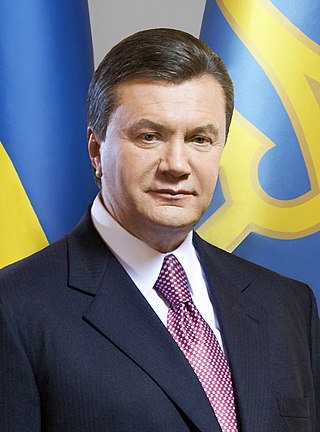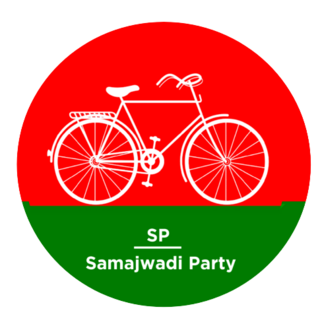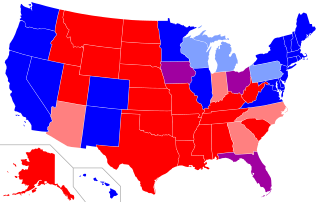Related Research Articles

Myanmar, officially the Republic of the Union of Myanmar, also known as Burma, is a country in Southeast Asia. It is the largest country by area in Mainland Southeast Asia, and has a population of about 54 million as of 2017. It is bordered by Bangladesh and India to its northwest, China to its northeast, Laos and Thailand to its east and southeast, and the Andaman Sea and the Bay of Bengal to its south and southwest. The country's capital city is Naypyidaw, and its largest city is Yangon.

The 2000 United States presidential election was the 54th quadrennial presidential election, held on Tuesday, November 7, 2000. Republican candidate George W. Bush, the governor of Texas and eldest son of the 41st president, George H. W. Bush, won the election, defeating incumbent Vice President Al Gore. It was the fourth of five American presidential elections, and the first since 1888, in which the winning candidate lost the popular vote, and is considered one of the closest U.S. presidential elections, with long-standing controversy about the result.

The Republican Party, also referred to as the GOP, is one of the two major contemporary political parties in the United States. The GOP was founded in 1854 by anti-slavery activists who opposed the Kansas–Nebraska Act, which allowed for the potential expansion of chattel slavery into the western territories. It has been the main political rival of the Democratic Party since the mid-1850s. Like them, the Republican Party is a big tent of competing and often opposing ideologies. Presently, the Republican Party contains prominent conservative, centrist, populist, and right-wing libertarian factions.

The Commonwealth of Independent States (CIS) is a regional intergovernmental organization in Eurasia. It was formed following the dissolution of the Soviet Union in 1991. It covers an area of 20,368,759 km2 (7,864,422 sq mi) and has an estimated population of 239,796,010. The CIS encourages cooperation in economic, political and military affairs and has certain powers relating to the coordination of trade, finance, lawmaking, and security. It has also promoted cooperation on cross-border crime prevention.

The president of India is the head of state of the Republic of India. The president is the nominal head of the executive, the first citizen of the country, as well as the commander-in-chief of the Indian Armed Forces. Droupadi Murmu is the 15th and current president, having taken office from 25 July 2022.

The Bharatiya Janata Party is a political party in India, and one of the two major Indian political parties alongside the Indian National Congress. Since 2014, it has been the ruling political party in India under Narendra Modi, the incumbent Indian prime minister. The BJP is aligned with right-wing politics, and its policies have historically reflected a traditional Hindu nationalist ideology; it has close ideological and organisational links to the Rashtriya Swayamsevak Sangh (RSS). As of February 2022, it is the country's largest political party in terms of representation in the Parliament of India as well as state legislatures.

Nandamuri Taraka Rama Rao, often referred to by his initials NTR, was an Indian actor, filmmaker and politician who served as Chief Minister of Andhra Pradesh for seven years over three terms. He starred in over 300 films, predominantly in Telugu cinema, and was referred by the media as Viswa Vikhyatha Nata Sarwa Bhouma. Rao received three National Film Awards for co-producing Thodu Dongalu (1954) and Seetharama Kalyanam (1960) under National Art Theater, Madras, and for directing Varakatnam (1970). Known for his breakthrough performances in Raju Peda (1954) and Lava Kusa (1963), Rao garnered the Nandi Award for Best Actor for Kodalu Diddina Kapuram in 1970, and the Inaugural Filmfare Award for Best Actor – Telugu in 1972 for Badi Panthulu.

Viktor Fedorovych Yanukovych is a former politician who served as the fourth president of Ukraine from 2010 until he was removed from office in the Revolution of Dignity in 2014, after a long series of protests in support of closer ties with the European Union by diverse civil-society groups in response to his rejection of the Ukrainian-European Association Agreement. From 2006 to 2007 he was the prime minister of Ukraine; he also served in this post from November 2002 to January 2005, with a short interruption in December 2004. He currently lives in exile in Russia, where he has lived since his removal from office in 2014.

The Samajwadi Party is a socialist political party in India. Headquartered in New Delhi, the party has mass base in Uttar Pradesh along with significant presence in other states as well. With a secular and democratic ideology, the Samajwadi Party believes in creating a socialist society, which works on the principle of equality. The party has been able to form the government in the state of Uttar Pradesh four times - three times under Chief Minister Mulayam Singh Yadav, the fourth and recent being Chief Minister Akhilesh Yadav’s full majority government in 2012-2017 Uttar Pradesh Legislative Assembly. The coalition of party and it’s alliance partners SP+ has one of the largest vote base in the state of Uttar Pradesh in terms of collective voting pattern in the state-based electoral system, with more than 37% vote share in 2022 elections.

Narendra Damodardas Modi is an Indian politician serving as the 14th and current Prime Minister of India since 2014. Modi was the Chief Minister of Gujarat from 2001 to 2014 and is the Member of Parliament from Varanasi. He is a member of the Bharatiya Janata Party (BJP) and of the Rashtriya Swayamsevak Sangh (RSS), a right-wing Hindu nationalist paramilitary volunteer organisation. He is the longest serving prime minister from outside the Indian National Congress.

All India Trinamool Congress, colloquially the Trinamool Congress is an Indian political party which is predominantly active in the Indian state of West Bengal. The party is led by Mamata Banerjee, the current Chief Minister of West Bengal, who has led the state since 2011. It is currently the third largest party in Parliament with 23 members in Lok Sabha and 13 members in Rajya Sabha and 230 MLAs in State legislative assemblies of India, just after BJP and INC. In 2016, the Election Commission recognised TMC as a national political party.

Starting with the 2000 United States presidential election, the terms "red state" and "blue state" have referred to U.S. states whose voters vote predominantly for one party — the Republican Party in red states and the Democratic Party in blue states — in presidential and other statewide elections. Examining patterns within states reveals that the reversal of the two parties' geographic bases has happened at the state level, but it is more complicated locally, with urban-rural divides associated with many of the largest changes.
An independent or non-partisan politician is a politician not affiliated with any political party or bureaucratic association. There are numerous reasons why someone may stand for office as an independent.

The Democratic Party is one of two major contemporary political parties in the United States. Founded in 1828, it was predominantly built by Martin Van Buren, who assembled a wide cadre of politicians in every state behind war hero Andrew Jackson, making it the world's oldest active political party. Its main political rival has been the Republican Party since the 1850s. Both parties are big tents of competing and often opposing ideologies. In recent times, both parties have homogenized greatly in their ideological views, with modern American liberalism — a variant of social liberalism — being the majority ideology in the party. The party also has notable centrist, left-libertarian, social democratic, and neoconservative factions.

The 2012 United States presidential election was the 57th quadrennial presidential election, held on Tuesday, November 6, 2012. Incumbent Democratic President Barack Obama and his running mate, incumbent Vice President Joe Biden, were re-elected to a second term. They defeated the Republican ticket of businessman and former Governor Mitt Romney of Massachusetts and Representative Paul Ryan of Wisconsin.

From January 3 to June 5, 2012, voters of the Democratic Party chose its nominee for president in the 2012 United States presidential election. President Barack Obama won the Democratic Party nomination by securing more than the required 2,383 delegates on April 3, 2012, after a series of primary elections and caucuses. He was formally nominated by the 2012 Democratic National Convention on September 5, 2012, in Charlotte, North Carolina.

The 2016 United States presidential election was the 58th quadrennial presidential election, held on Tuesday, November 8, 2016. The Republican ticket of businessman Donald Trump and Indiana governor Mike Pence defeated the Democratic ticket of former secretary of state and First Lady of the United States Hillary Clinton and the United States senator from Virginia Tim Kaine, in what was considered a large upset. Trump took office as the 45th president, and Pence as the 48th vice president, on January 20, 2017. It was the fifth and most recent presidential election in which the winning candidate lost the popular vote. It was also the sixth presidential election, and the first since 1944, in which both major party candidates were registered in the same home state.

The election of the president and the vice president of the United States is an indirect election in which citizens of the United States who are registered to vote in one of the fifty U.S. states or in Washington, D.C., cast ballots not directly for those offices, but instead for members of the Electoral College. These electors then cast direct votes, known as electoral votes, for president, and for vice president. The candidate who receives an absolute majority of electoral votes is then elected to that office. If no candidate receives an absolute majority of the votes for president, the House of Representatives elects the president; likewise if no one receives an absolute majority of the votes for vice president, then the Senate elects the vice president.

The 2012 United States elections took place on November 6, 2012. Democratic President Barack Obama won reelection to a second term and the Democrats gained seats in both chambers of Congress, retaining control of the Senate even though the Republican Party retained control of the House of Representatives. As of 2022, this is the most recent election cycle in which neither the presidency nor a chamber of Congress changed partisan control, and the last time that the winner of the presidential race provided coattails for their party in both the House of Representatives and the Senate.

The 2024 United States presidential election will be the 60th quadrennial presidential election, scheduled for Tuesday, November 5, 2024. It will be the first presidential election after electoral votes were redistributed during the 2020 census reapportionment cycle. The incumbent, President Joe Biden, stated in January 2022 his intent to run for reelection with Vice President Kamala Harris as his running mate. As of February 2023, Biden has not formally announced a reelection campaign. In November 2022, former president Donald Trump announced his candidacy for president for a second, nonconsecutive term.
References
- ↑ Tilastokeskus. "Kunnallisvaalit 1976-2012, puolueiden kannatus". Archived from the original on 26 May 2012. Retrieved 14 December 2014.